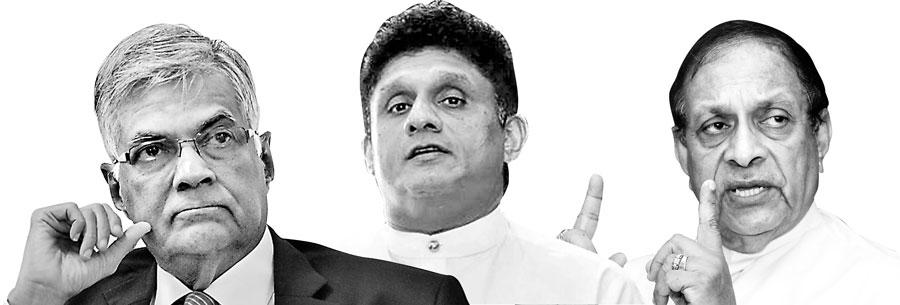Reply To:
Name - Reply Comment

 The next President will be constitutionally weak – which means it doesn’t matter who succeeds the constitutionally weak President we have already. The UNP’s strategy, given this, is to field a candidate who will gain legitimacy in the eyes of the electorate it has never really pandered to: the Sinhala Buddhist peasantry. The Sinhala Buddhist bourgeoisie will also throw its weight behind him, as will the minorities, including the Muslims, who have more reasons than one to fear a Rajapaksa Restoration.
The next President will be constitutionally weak – which means it doesn’t matter who succeeds the constitutionally weak President we have already. The UNP’s strategy, given this, is to field a candidate who will gain legitimacy in the eyes of the electorate it has never really pandered to: the Sinhala Buddhist peasantry. The Sinhala Buddhist bourgeoisie will also throw its weight behind him, as will the minorities, including the Muslims, who have more reasons than one to fear a Rajapaksa Restoration.
The UNP under Ranil Wickremesinghe faces its bleakest prospects this year. As of now, it remains vaguely divided between three factions: those for Wickremesinghe, those for the candidate (whoever he may be) and those for neither. Given its reduced circumstances, the Wickremesinghe faction has “gone down.” The neither-here-nor-there crowd, also, has reduced in popularity, which explains why politico-intellectuals like Harsha de Silva are facing such a furore even over their social media posts. The best bet the UNP has is the second group, one with a long history of trying to oust Wickremesinghe from power. They are, to offer the historical analogy, the capitalist republican Orléanists, while the Rajapaksas are the Bonapartists.
In the run up to the 2015 election, two names were proposed as common candidates from the UNP; Sajith Premadasa and Karu Jayasuriya. Of the two, Karu was more aligned with the Wickremesinghe faction; as an aspirant to the presidency, he was also seen to be more inflexible, less popular, and, as Dayan Jayatilleka pointed out, more inclined towards the Sinhala Buddhist bourgeoisie.
If the propaganda being spun in favour of a Sajith Premadasa presidency seems as full of sound and fury as Rohitha’s wedding, it’s not because people don’t like the man, but rather because the private media has ballooned his image well beyond the plausible
 Like Gotabaya (though not quite like him), Karu has a military record, but over the years, his business, mayoral, ministerial and parliamentary roles have superseded that in the popular consciousness. Nevertheless, he does have nationalist credentials, not least because he, unlike those who crossed over to the Rajapaksas, did not support the war and then ride on post-war euphoria by accepting a ministerial portfolio: he went back to his mother party, a sign of loyalty few in that party can claim.
Like Gotabaya (though not quite like him), Karu has a military record, but over the years, his business, mayoral, ministerial and parliamentary roles have superseded that in the popular consciousness. Nevertheless, he does have nationalist credentials, not least because he, unlike those who crossed over to the Rajapaksas, did not support the war and then ride on post-war euphoria by accepting a ministerial portfolio: he went back to his mother party, a sign of loyalty few in that party can claim.
Karu Jayasuriya also does not have the support of private media outlets which were conspicuous by their denigration of Ranil Wickremesinghe in the tussles that erupted between his faction and that of Sajith Premadasa in 2013. Regardless of his former nationalist credentials, moreover, the Karu Jayasuriya of today is not the man we saw in those troubling, turmoil-filled times: his role as parliamentary speaker has not been free of controversy, and the treatment he meted out to the UPFA during the illegal Sirisena-Rajapaksa administration was at odds with the treatment, or the lack thereof, meted out to the UNP in the wake of its horrendous, indifferent and callous inactions and omissions regarding the Easter Sunday attacks. This is not to say he is easy to manipulate, but that is the impression he has given so far.
The UNP runs on merchant capital; this has been true since 1947. The kind of Sinhala Buddhist bourgeoisie it has won over mostly hail from Colombo and its immediate suburbs
He is also, I regret to note, a tad too old. This, of course, is not an impediment: J.R. Jayewardene was all of 77 when he assumed office in 1977, and contrary to accounts made of him by biographers, he assumed leadership of the party after a long, drawn out battle with the ‘Elder’ Dudley Senanayake. Karu has shown himself to be resilient in the face of attacks even from his party, and has shown what fortitude and patience can do, even if in the last six or seven months his prospects have diminished. The ‘age’ factor, however, lingers and the floating voter who elected Sirisena in 2015 has now, partly as a defence mechanism, translated his or her calls for the removal of all 225 MPs to a blatant distrust of old politicos.
Karu’s gentlemanly cosmopolitanism is therefore at odds strikingly with Sajith Premadasa’s flash and frank presence. Sajith Premadasa, of course, is not his father, just as Namal, Rohitha and Yoshitha are not their father. The hysteria of those media outlets supportive of him and their championing of him as Punchi Premadasa are superfluous in a way the aura surrounding the Rajapaksas, particularly Gotabaya, manufactured and spun by other private media outlets, is not. So if the propaganda being spun in favour of a Sajith Premadasa presidency seems as full of sound and fury as Rohitha Rajapaksa’s wedding, it’s not because people don’t like the man, but rather because the private media has ballooned his image well beyond the plausible.
Sajith curries favour with a larger, more widely-dispersed base, young, old and in-between. He cannot be compared to the Rajapaksa progeny because the Rajapaksa progeny are seen as the reason why Mahinda Rajapaksa lost his halo in 2015. But like them, he has his own skeletons in the closet: not least among them, allegations that he ‘faked’ his higher education credentials. On the other hand, he appeals to a section that the Rajapaksas have more or less captured: the Sinhala Buddhist peasantry, which has been the main source of the nationalist vote for the UNP. In addition, like Karu, he commands the respect of the Sinhala Buddhist bourgeoisie; they happen to espouse a centre-right populist nationalism his father was an exponent of, which, as Dayan Jayatilleka once described it, amounted to “growth with equity.”
What makes a Sajith presidency appealing to the Sinhala Buddhist bourgeoisie, of course, is his age and his father’s legacy; the truth of the matter is that even at their most populist, neither Ranil nor Karu can muster up the kind of hair-raising emotion Sajith is capable of mustering. The bourgeoisie will be willing to overlook any other factor – caste and class – as they did when they voted for his father in 1988. Whether this is enough to validate and justify his claims to the presidential throne is, of course, questionable; also questionable is whether he will, if elected to power, be as constitutionally weak as, if not weaker than, his predecessor and whether his Prime Minister will emerge as the real executor over him. Given that, we can’t prophesy these things we will not be able to fathom until the eleventh hour.
Balancing the debit side to his presidential image is his credit side. Like Ranjan Ramanayake, Sajith has time and time again condescended to performing theatrics to get his point across; unlike Ramanayake, whose political persona is indistinguishable from his onscreen tough-guy incarnation, he lacks the finesse, the brutal honesty and the credibility that can legitimise those theatrics.
To this day, Ramanayake has never risked the sort of stunt Sajith did, at his expense, in that hilarious ‘kamkaru/security’ fiasco. One associates such theatrics with Palitha Thewarapperuma who, as I have pointed out, represents not the populist roots of the party but the jettisoned underclass in it (which neither Wickremesinghe nor Premadasa pretends to represent). Well to do, tough and outspoken, Sajith neither has Ramanayake’s ability to back his theatrics with action nor Thewarapperuma’s resolve to crossing the hard yards when getting his point across.
In short, he has all the defects of politicians like Ramanayake, Thewarapperuma and the other UNP demagogues without the compensating virtues. The only virtue I can think of is that those in his faction are more popular, more well-regarded and more beloved by their electorates than those who were installed in their place; the truth is that a person like Buddhika Pathirana was more popular at his electorate in Matara than someone like Sagala Ratnayake – though Ranil Wickremesinghe opted for the latter when dishing out appointments. There are other names as well, not least of them Dilip Wedaarachchi, who despite the stunts they got themselves into command more grassroots support than the overly refined Colombo 7 Ranilistas.
The UNP runs on merchant capital; this has been true since 1947. The kind of Sinhala Buddhist bourgeoisie it has won over mostly hail from Colombo and its immediate suburbs. With the rise of Gotabaya Rajapaksa, it remains to be seen whether this cross section of the Buddhist electorate will be won over by the Pohottuwa. In Sajith, that cross section probably sees a hero, the messiah who will give them a reason to vote for the UNP: the assurance that once he is voted to power, he will purge the top rungs of the Ranilistas who have, for too long, distanced Sirikotha from the multitude of the Sinhala Buddhist population to which they belong.
Come 2020 and we may well see a split in the grand (green?) old party between the Legitimists and the Orléanists. Regardless of who wins the election, I think we can all safely say the way things stand now, the deposed Orléanists, representing not the Reid Avenue Legitimists but republican forces of capital, are on their way to power. In the long run, there may well be a Royalist Restoration. But as John Maynard Keynes once said, in the long run we are all dead.